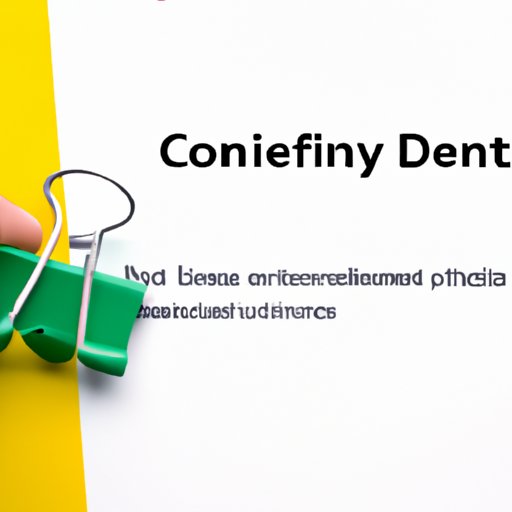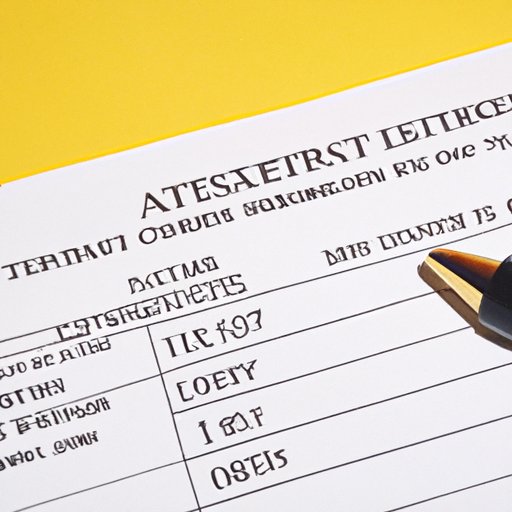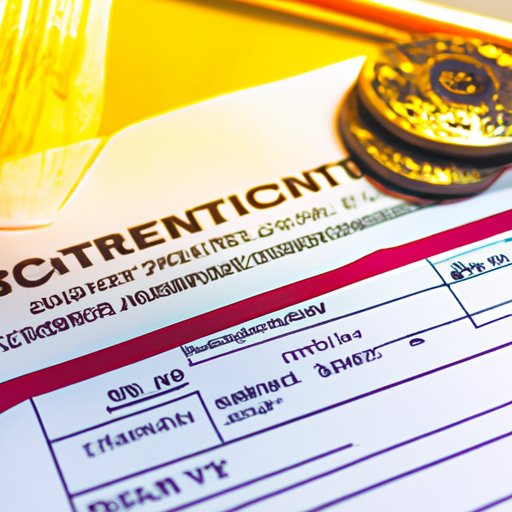Introduction
A certificate of deposit, commonly referred to as a CD, is a financial product offered by banks and other financial institutions. It is a type of savings account that offers higher interest rates than a regular savings account but with some restrictions. In exchange for a higher rate of return, investors agree to keep their money invested in the CD for a predetermined period of time. In this article, we will explore how a certificate of deposit works, the benefits of investing in a CD, the types of CDs available, interest rates, early withdrawal penalties, and the tax implications of investing in a CD.

Explaining the Basics of a Certificate of Deposit
A certificate of deposit is a type of savings account that is issued by a bank or other financial institution. The investor agrees to keep their funds deposited in the CD for a specific period of time, usually ranging from three months to five years. In exchange for keeping their money invested for a certain amount of time, the investor is rewarded with a higher rate of interest than a traditional savings account.
What Is a CD?
A certificate of deposit is a type of savings account that pays a fixed rate of interest for a predetermined period of time. Investors can choose from a variety of terms, ranging from three months to five years. CDs are FDIC insured, so investors can be assured that their deposits are safe.
How Does a CD Work?
A certificate of deposit works like a traditional savings account in that you deposit money into the account and earn interest on the balance. However, unlike a traditional savings account, the investor agrees to leave the money in the CD for a set period of time. If the investor withdraws the money before the end of the term, they will incur an early withdrawal penalty.
What Are the Different Types of CDs?
There are several different types of certificates of deposit available. These include short-term CDs, long-term CDs, variable-rate CDs, and jumbo CDs. Each type of CD has its own advantages and disadvantages, so it is important to understand the differences between them before investing.
Explaining the Benefits of Investing in a Certificate of Deposit
Investing in a certificate of deposit offers several benefits, including higher interest rates than a savings account, FDIC insurance, flexible terms, and easy opening. Here are some of the benefits of investing in a CD:
Higher Interest Rates than a Savings Account
One of the primary benefits of investing in a certificate of deposit is the higher interest rate. According to a study by Bankrate, the average interest rate for a 12-month CD is currently 0.25% higher than the average rate for a savings account. This means that investors who choose to invest in a CD can earn more interest on their money than if they had kept it in a savings account.
FDIC Insured
Another benefit of investing in a certificate of deposit is that it is FDIC insured. This means that your deposits are protected up to $250,000 in the event that the bank fails. This provides peace of mind knowing that your money is safe and secure.
Flexible Terms
Investors can choose from a variety of terms when investing in a certificate of deposit. This allows investors to find a CD that meets their individual needs and goals. For example, if an investor wants to save for a short-term goal such as a vacation, they can choose a short-term CD with a lower interest rate. On the other hand, if an investor is looking for a long-term investment, they may opt for a longer-term CD with a higher interest rate.
Easy to Open
Opening a certificate of deposit is relatively easy. In most cases, all you need to do is fill out an application form and provide the necessary documentation. Most banks also offer online applications, which makes the process even easier.
Low Risk Investment
Investing in a certificate of deposit is considered to be a low risk investment. Since the investor is not able to withdraw the money until the end of the term, there is very little chance of losing money. Additionally, since the CD is FDIC insured, the investor can rest assured that their funds are safe and secure.
Comparing Types of Certificates of Deposit
When investing in a certificate of deposit, investors have several options to choose from. Here is a brief overview of the different types of CDs available:
Short-Term CDs
Short-term CDs typically have terms of three months to one year. These CDs tend to have lower interest rates than long-term CDs, but they also offer more flexibility. For example, if an investor needs access to their money sooner rather than later, a short-term CD may be the best option.
Long-Term CDs
Long-term CDs typically have terms of three years or more. These CDs tend to have higher interest rates than short-term CDs, but they also require the investor to keep their money invested for a longer period of time. Long-term CDs are best suited for investors who are looking for a long-term investment.
Variable-Rate CDs
Variable-rate CDs are CDs that have an interest rate that can fluctuate over time. These CDs typically have terms of one to five years and can provide higher returns than traditional CDs. However, they are also more risky since the interest rate can change at any time.
Jumbo CDs
Jumbo CDs are CDs that require a minimum deposit of $100,000 or more. These CDs typically offer higher interest rates than traditional CDs, but they also come with higher fees and restrictions. Jumbo CDs are best suited for investors who have a large amount of money to invest.
Exploring Interest Rates on Certificates of Deposit
The interest rate on a certificate of deposit is one of the most important factors to consider when deciding whether to invest in a CD. Here is an overview of the factors that affect interest rates and how to compare them:
Factors That Affect Interest Rates
Several factors affect the interest rate on a certificate of deposit. These include the length of the term, the amount of the deposit, the type of CD, and the current market conditions. The longer the term, the higher the interest rate; the larger the deposit, the higher the interest rate; and the higher the market interest rates, the higher the interest rate on a CD.
Comparing Interest Rates
When comparing interest rates, it is important to take into account the different factors that affect the rate. You should also compare the rates offered by different banks to make sure you are getting the best rate. Additionally, you should check to see if the bank offers any special promotions or bonuses that could increase the interest rate.

Understanding Early Withdrawal Penalties for Certificates of Deposit
If an investor withdraws their money from a certificate of deposit before the end of the term, they will incur an early withdrawal penalty. Here is an overview of when these penalties apply and what they entail:
What Penalties Apply
The amount of the penalty depends on the terms of the CD and the amount of the withdrawal. Generally, the penalty is equal to a certain percentage of the amount withdrawn. For example, a CD may have a penalty of 3% for withdrawals made within the first six months of the term.
When Penalties Apply
Early withdrawal penalties typically apply if the investor withdraws their money before the end of the term. Some banks may waive the penalty for certain circumstances, such as medical emergencies or job loss. It is important to check the terms of the CD before making a withdrawal to avoid incurring a penalty.

Examining Tax Implications of Investing in a Certificate of Deposit
Investing in a certificate of deposit can have both tax advantages and disadvantages. Here is an overview of the different types of CDs and how they are taxed:
Taxable vs. Non-Taxable CDs
Most CDs are considered taxable investments, meaning that the interest earned on the CD is subject to income tax. However, some CDs, such as municipal CDs, are non-taxable. This means that the interest earned on these CDs is exempt from federal and state income taxes.
Tax Advantages and Disadvantages
The biggest advantage of investing in a certificate of deposit is that the interest earned is generally taxed at a lower rate than other types of investments. Additionally, some CDs, such as municipal CDs, are non-taxable. On the other hand, the interest earned on a CD is subject to compound interest, which can result in a higher tax bill. Additionally, the early withdrawal penalty may be subject to income tax.

Evaluating the Pros and Cons of a Certificate of Deposit
Before investing in a certificate of deposit, it is important to evaluate the pros and cons to determine if it is the right investment for you. Here is a summary of the pros and cons of investing in a CD:
Pros
Investing in a certificate of deposit offers several benefits, including higher interest rates than a savings account, FDIC insurance, flexible terms, and easy opening. Additionally, CDs are considered to be a low risk investment since the investor cannot withdraw the money until the end of the term.
Cons
The biggest disadvantage of investing in a certificate of deposit is that the investor must keep their money invested for a predetermined period of time. Additionally, if the investor withdraws their money before the end of the term, they will incur an early withdrawal penalty. Finally, the interest earned on a CD is subject to income tax.
Conclusion
A certificate of deposit is a type of savings account that offers higher interest rates than a traditional savings account. It is a low risk investment that is FDIC insured and offers flexible terms. When considering investing in a CD, it is important to understand the different types of CDs available, the interest rates, early withdrawal penalties, and the tax implications. By understanding these factors, investors can make an informed decision about whether a certificate of deposit is the right investment for them.
(Note: Is this article not meeting your expectations? Do you have knowledge or insights to share? Unlock new opportunities and expand your reach by joining our authors team. Click Registration to join us and share your expertise with our readers.)
